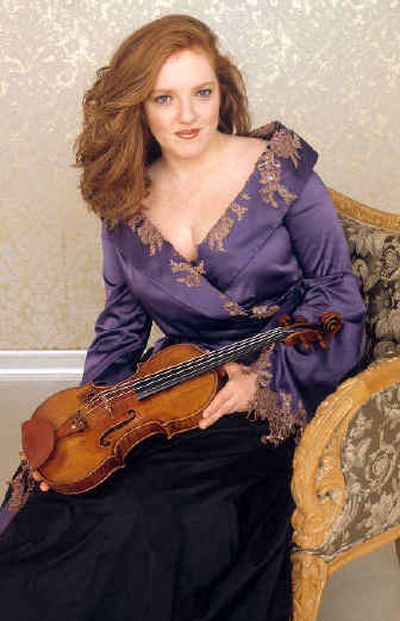Early lure of dress brings violinist success

Violinist Rachel Barton Pine commands a career that includes appearances with major orchestras, 10 successful CDs, and collaborations with colleagues ranging from conductor Zubin Mehta to fiddler Mark O’Connor to the rock band Kansas.
But she was lured into playing by her desire for a pretty dress.
“When I was 3,” the 29-year-old musician recalls, “I saw a group of middle-school-age girls playing the violin at my church, and they had on the most beautiful long dresses. So I asked for a violin. Of course, it was also the sound of the violin, but it was those dresses that first attracted me.”
Barton Pine will perform concertos by O’Connor and Johannes Brahms with the Coeur d’Alene Symphony on Saturday at North Idaho College. The concert, conducted by music director David Demand, also will include Beethoven’s Symphony No. 1 in the orchestra’s season finale.
And on Sunday, she will appear with the Spokane String Quartet at The Met. Barton Pine will be featured in a series of works for unaccompanied violin in the concert’s first half, then will join the quartet for Antonin Dvorak’s Quintet in E-flat major, Op. 97.
“My parents got me a violin thinking it would be a nice little hobby,” she said in a telephone interview from her hometown Chicago. “They were surprised when I became so passionate about it; I practiced and practiced all day long.”
Barton Pine was home-schooled, and from the time she was 9, she studied violin with Almita and Ramon Vamos with additional lessons from Chicago Symphony concertmaster Ruben Gonzales.
“By the time I was 11,” she says, “I had increased my practice hours to sometimes eight hours a day.”
She first soloed with the Chicago Symphony when she was 10 and played again with the orchestra when she was 15. Even as a teenager, she became the family breadwinner.
“My father was one of those hard-luck kind of guys who couldn’t keep a job and my mother was taking care of the three of us,” she says. “So I started playing orchestra jobs, doing studio work, playing for commercial jingles, weddings, anything I could find, to support the family.”
The practice paid off. In the years between her 16th and 18th birthdays, Barton Pine won prizes in a series of international violin competitions. At 17, she became the first American and the youngest participant ever to win the gold medal in the J.S. Bach International Violin Competition in Leipzig.
At 18, she made her first recording and her career was gathering steam. That career was nearly halted at age 22, when the strap of Barton Pine’s violin case was caught in the door of a Metra train in Chicago and she was pulled under its wheels. She lost a leg, but not her nerve and ambition.
After her recovery, she returned to the recording studio and then to touring. Along with orchestral and recital engagements and recordings for the Dorian, Cacophony and Cedille labels, Barton Pine made frequent radio appearances on rock stations in Chicago.
“I grew up with classical music until I discovered the radio when I was about 10,” she says. “Then I listened to Top 40 and classic rock. Later, when I was 12 or 13, I was consistently drawn to the harder-edged stuff and I have been a big heavy metal fan ever since.”
She even has a CD of rock covers for the Cacophony label that includes such pieces as Pantera’s “Cowboys from Hell” and Metallica’s “Fade to Black” alongside Paganini’s showy 24th Caprice.
Barton Pine also played “The Star-Spangled Banner” for some of the Chicago Bulls’ playoff games in the Michael Jordan era. Those appearances brought her together with renowned fiddler O’Connor.
“Mark is a big basketball fan,” she says. “He saw me on TV and liked the Paganini-esque rendition of the National Anthem I’d come up with, and he’d heard of my outreach effort where I was trying to introduce my rock-loving peers to the excitement of classical music.”
O’Connor invited her to teach at his fiddle camp. Last summer, he performed at her wedding to software developer Greg Pine.
Despite her broad range of musical activities and interests, classical music remains closest to Barton Pine’s heart.
“Classical music in particular gets in touch the most deeply with our humanity and expresses who we are as people and expresses all our emotions to the highest degree,” she says.
Her appearance with the Strinq Quartet on Sunday will feature performances of works for unaccompanied violin, a genre for which Barton Pine has become well known. Two of her CDs include violin pieces without accompaniment.
“There are so many great unaccompanied pieces,” she says. “I’m always doing a different mix. It’s hard to decide which ones not to do. In Spokane, I’ll definitely play some Bach and some some of the caprices by Mark O’Connor, maybe my ‘New Zealand Variations,’ and a new piece written for me called ‘Rush’ by Augusta Read Thomas, the composer-in-residence of the Chicago Symphony.”
In addition to her performances, recording and teaching, Barton Pine has established a foundation focusing on music education.
“We have a scholarship program designed to help young artists who are talented, ambitious and in financial need,” she explains. “It’s not a traditional scholarship program that pays the cost of lessons, but it helps them with other costs such as buying sheet music, paying for piano accompanists, paying the cost of travel to competitions, the cost of making audition tapes … costs young artists face that most people don’t even think about.”